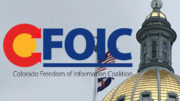This column first appeared on the website of the Fort Collins Coloradoan. It is reprinted here with the Coloradoan’s permission.
By Steve Zansberg
CFOIC President
On Thursday, Gov. John Hickenlooper signed into law Senate Bill 17-040, which was introduced by Sen. John Kefalas, D-Fort Collins.
All Coloradans owe both men, and several other elected officials, a huge debt of gratitude. The new law makes express a guarantee that those of us in the “records requester community” had previously argued was implicit in the Colorado’s Open Records Act: the right of all Coloradans to receive digitized copies of public records that the government maintains in a digitized format.

Steve Zansberg
Having access to records in these formats enables citizens to search and sort government data to make sense of it and to analyze it in ways that government offices might not have done previously. By mandating that searchable digital records must be provided in a searchable format and sortable digital records must be produced in a sortable digital form, Colorado joins some 15 other states whose open records laws so require.
This huge advance in government transparency certainly deserves celebration.
Before announcing the individuals and organizations who deserve the credit for this accomplishment — please hold your applause until the end of the list, thanks — it is worth remembering the pivotal role in that the Fort Collins Coloradoan played in this saga.
Two years ago, Coloradoan reporter Nick Coltrain set out to report on differences in the compensation paid to professors at Colorado State University. In response to his request to inspect public records, CSU refused to provide access to its digitized database showing the salary information for some 4,800-plus university employees. Coltrain photographed a 145-page paper version of the database and manually reassembled it, a laborious process that took weeks to complete (reporting that showed administrators close to President Tony Frank received higher raises by percentage than rank-and-file.).
Although CSU was technically within its rights under the law (because it “maintained” a non-digital copy of the database), its refusal to exercise its discretion to provide the data prompted me to write a guest column criticizing CSU. That column caught the eye of Sen. Kefalas, who introduced a bill to require public records custodians to provide access to digitized databases. That bill was defeated in the 2016 session.
Over the summer of 2016, the Secretary of State convened a group of government lawyers and representatives of several public interest groups (Colorado Ethics Watch, Common Cause, the Independence Institute, and the Colorado Freedom of Information Coalition) to re-work the defeated bill and accomplish the same objective.
Once again, Kefalas introduced the bill, SB-17-040, with co-sponsors Sen. Bob Gardner and Rep. Dan Pabon. The bill meandered its way through the Senate and became the subject of numerous records-closing amendments. In the House, Pabon, along with his colleagues Mike Weissman and Chris Kennedy, worked long days and nights on the final two days of the 2017 legislative session, meeting with government lawyers from the Secretary of State’s office, the University of Colorado Boulder and the Attorney General’s office, along with the bill’s proponents (including Lauren Gustus, Chris Koeberl, Shayne Madsen, Elena Nunez, Peg Perl, and the CFOIC’s Jeff Roberts) to hash out a compromise bill that was quickly approved by both houses on the final day of the session. Colorado Press Association lobbyist Greg Romberg deserves the Nobel Peace Prize for helping to keep the diverse factions “at the table,” exchanging bill amendments and reaching a consensus.
As a result of these herculean efforts, and good faith efforts by parties on both sides of the table to get something done, Senate Bill 17-040 is now the law of the land, to take effect on Aug. 9. Kudos to Sen. Kefalas and Rep. Pabon: Without their passion, commitment and persistence, this major improvement to government transparency would not have occurred.
OK, you can now applaud. I know I am.
Steve Zansberg, president of the Colorado Freedom of Information Coalition, is a partner in the law firm Levine Sullivan Koch & Schulz, LLP.
Follow the Colorado Freedom of Information Coalition on Twitter @CoFOIC. Like CFOIC’s Facebook page. Do you appreciate the information and resources provided by CFOIC? Please consider making a tax-deductible donation.




